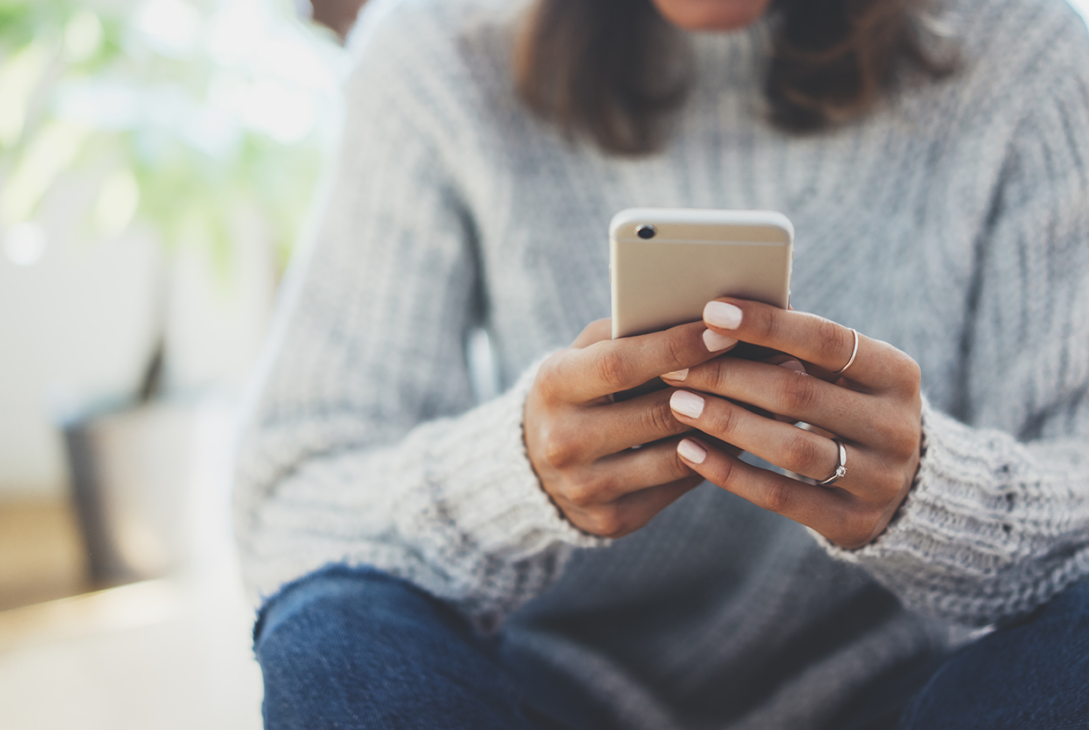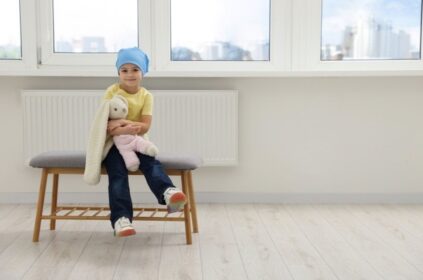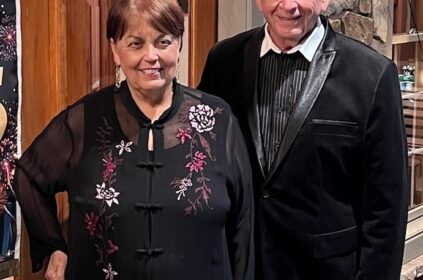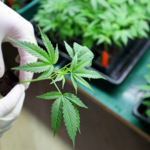The practitioner felt the lump first: on the side of Jessica’s left breast, sitting at around the 2- or 3-o’clock position.
Although the lump was concerning, the practitioner said nothing. Jessica was just 33 years old — way too young, in the practitioner’s opinion, for her to have cancer. When the clinical exam was finished, Jessica was sent on her way with no recognition of what was coming.
In college, at 18 years old, Jessica had previously found a lump in her right breast at the 6-o’clock position. Physicians initially thought it was a cyst, but the lump was later determined to be a solid, but benign, mass called a fibroadenoma. The experience had shocked Jessica, and she had been doing breast self-exams ever since.
So, it only took two days after her Well Woman visit for Jessica to discover the lump in her left breast that the practitioner had neglected to tell her about. A lump that didn’t quite feel right. A lump that, after further testing, led to what Jessica says was an intensive:
“16 rounds of chemotherapy, 24 rounds of radiation, a double mastectomy, a hysterectomy, and a 10-hour fat graft reconstruction where doctors took fat tissue and blood vessels from my stomach and placed them into my chest to recreate my body.”
After speaking with her friends about her breast cancer diagnosis, Jessica was stunned to learn that almost nobody else performed breast self-exams. Later, while working with the NFL during the Crucial Catch Campaign, the problem crystallized: many people also missed screenings, meaning later diagnoses and worse outcomes.
To Jessica, something needed to change — and she was the person who would push for that change. Jessica recently sat down with WHATNEXT to discuss her six-year survivorship, advice for others going through breast cancer, and her free app “Feel For Your Life” (available on the Apple Store or Google Play) which shows users how to perform self-exams, track progress, and set daily reminders.
The Importance of Self-Exams in Identifying Breast Cancer
“How did you even know to get checked for breast cancer?” a friend asked one day, during the period when Jessica was still receiving chemotherapy.
When Jessica explained that she performed breast self-exams after every menstrual cycle, she heard crickets. Nobody else in her friend group did the same. Jessica explains:
“As I opened this conversation more broadly, I learned that there are three reasons why women don’t perform self-exams. The first is that they are uncomfortable touching themselves or uncomfortable with their bodies. Next, nobody had shown them how and they felt overwhelmed trying to learn. And finally, some people are uninsured or underinsured. They’re afraid of finding breast cancer but not knowing, or being able to, handle it.”
Reflecting on her experiences, Jessica sees this as where her advocacy ignited. A self-exam had saved her life and she felt compelled to resolve or bridge the existing educational gaps. The first iteration of Feel For Your Life was born.
At first, Feel For Your Life was a social media project and act of catharsis for Jessica. She shared her story and experiences while also reinforcing the importance of breast cancer screenings.
Then football changed everything.
Crucial Catch Campaign
During the pandemic, Jessica was working closely with the NFL on the Crucial Catch Campaign. The campaign’s mission centers around early cancer detection and risk reduction by providing individuals with the tools they need to help them better understand their risk.
Here, Jessica learned that only 59% of women under age 40 go for routine mammograms every year. Skipped screenings and a lack of education on self-exams, both mean that the number of women diagnosed with later-stage breast cancer continues to rise. Physicians are beginning to recognize the need for earlier screenings. Jessica says:
“I’ve recently read that some doctors want to begin speaking with women around 25 years old to go over what screenings they’ll need, their breast density, and their genetic predisposition to cancer. These are crucial conversations to have, and this information informs your ability to care for your breast health.
I also believe starting these conversations at younger ages rejects the misconception of being ‘too young’ to have cancer. Each year, 12,000 women under age 40 are diagnosed with breast cancer. I just memorialized a friend who was 24 years old. When younger women visit the doctor about breast health, we often hear: ‘It’s just hormones. You’re just stressed. You’re overweight. Maybe you’re drinking too much.’ We’re pressured and gaslit by our doctors and insurance, and we find ways to gaslight ourselves too. Through Feel For Your Life, I aim to empower women to know their bodies and feel confident speaking up when something feels wrong.”
Feel For Your Life: An Invaluable Tool in the Breast Cancer Community
After Jessica learned the facts from the Crucial Catch Campaign she sprang into action, turning her pain into power and her social media project into a free app that shows women how to perform self-exams, track your progress, and set daily reminders. With a smile, Jessica adds:
“And it’s saving lives all over the world today.”
With a quiet determination, she recounts why Feel For Her Life is so personally rewarding:
“As I was creating Feel For Your Life, and as I was facing my own battle with cancer and my own survivorship, I thought about the women who came before me. Fourteen women in my family have been diagnosed with breast cancer. I’m part of the fourth generation of women with breast cancer on my dad’s side of the family. No known gene mutation has been found. I always say that cancer ran in my family until it ran into me, and I’m going to do something to stand up and educate others.”
The official Feel For Your Life app launched in 2021, and has since reached tens of thousands of women globally. At this point, the app already has over 60,000 downloads and Jessica hopes to hit 100,000 by the end of 2024.
Feel For Your Life offers a variety of resources for women, including information on genetic testing, how to learn your breast density, surgical and non-surgical options to reduce breast cancer risk, types of screening, and how to do a self-exam. Jessica explains:
“I love that people are caring more about their breast health. It’s incredibly rewarding that people come to me for their breast health advocacy: helping them be a voice in their care, showing them how to better communicate with providers, standing up to gaslighting, overcoming denials with insurance, negotiating medical bills. It’s an honor and a privilege to be trusted with these things, and I don’t take it for granted.”
In April 2024, the Feel For Your Life app also launched a new tool called Breast Friend AI. This AI can translate a user’s pathology reports or lab work from any screenings or blood work into easier, more accessible terminology to better communicate with their medical provider. Further, Breast Friend AI puts together a list of specific questions, based on the user’s pathology, to ask their doctor. Many times, people are trying to wrap their heads around diagnosis and treatment; other important questions may fall to the wayside. This tool allows people to make informed health decisions. But Breast Friend AI also has other exciting functionality, shares Jessica:
“You can ask it for a location to get screened that has 3D mammography, or AI software that reads mammography screenings. Breast Friend AI asks if you have insurance or need an accessible facility that can take you without. You can even ask it to create a hype playlist to get ready for appointments. This is the tool I wish I had before, and during, my breast cancer diagnosis.”
In the future, Jessica hopes that Feel For Your Life will partner with other organizations, offer a telehealth option, and leverage AI tools in the app to help with medical bill negotiation. At the end of the day, the sky is the limit — and Jessica is not ready to stop.
Download “Feel For Your Life” (available on the Apple Store or Google Play).
Further Breast Cancer Advocacy
Beyond Feel For Your Life, Jessica participates in advocacy on the state and federal level to make healthcare more accessible, and close insurance loopholes that harm patients. In Tennessee, Jessica helped advance the Feel For Your Life Act which would require high school students to learn about skin, breast, and testicular exams. Says Jessica:
“We know that teenagers are very aware of their bodies at that age. So let’s teach them how to properly take care of themselves.”
On a federal level, Jessica wants to see more done for the Access Act, a provision that would allow people with subsidies under an Affordable Care Act plan to apply it for either their premium or a Health Savings Account (HSA) to pay for what insurance won’t cover. She explains:
“Women under 40 years old must fight to get screened under insurance. With access to a HSA, women could pay for mammograms without having to jump through hoops.”
So far, the Feel For Your Life Act has seen bipartisan support — something that Jessica believes is incredibly important. This isn’t a political matter, she says, but an opportunity for people to receive better quality care and have their premiums go towards services they should have access to.
Caring for Others in the Breast Cancer Community
While her advocacy work motivates and inspires her, Jessica’s goals remain grounded in her desire to support the breast cancer community and to help women perform self-exams so that any cancer can be caught early. She encourages women to:
- Find a great doctor who will advocate with — and for — you.
- Do your own self-exams at home to stay abreast of your health.
- Get into a screening routine, or at least converse with your doctor about when to start.
- Know your breast density.
- Speak with your physician about your genetic disposition to breast cancer and other cancers.
For women who have been diagnosed with breast cancer, Jessica also reminds you that you are stronger than you think:
“Take it one day at a time. Where you are right now is not where you’ll be in the future. The day you do today, you’ll never have to do it again. Understand your limits and energy levels. What you can and cannot do. What you will and will not tolerate. Set boundaries in your care. And just know that you’re going to be okay. It does get better, day by day.”
Editor’s Note: Get Involved
Cancer doesn’t discriminate. WHATNEXT and its partners are interested in amplifying the voices of those from all identities and backgrounds. If you have a cancer journey to share, reach out here to learn more about how your voice can help spread awareness and inspire individuals from all walks of life.
breast cancer breast self-exams feel for your life fibroadenoma interview oncology patient advocacy patient stories series
Last modified: August 15, 2024











